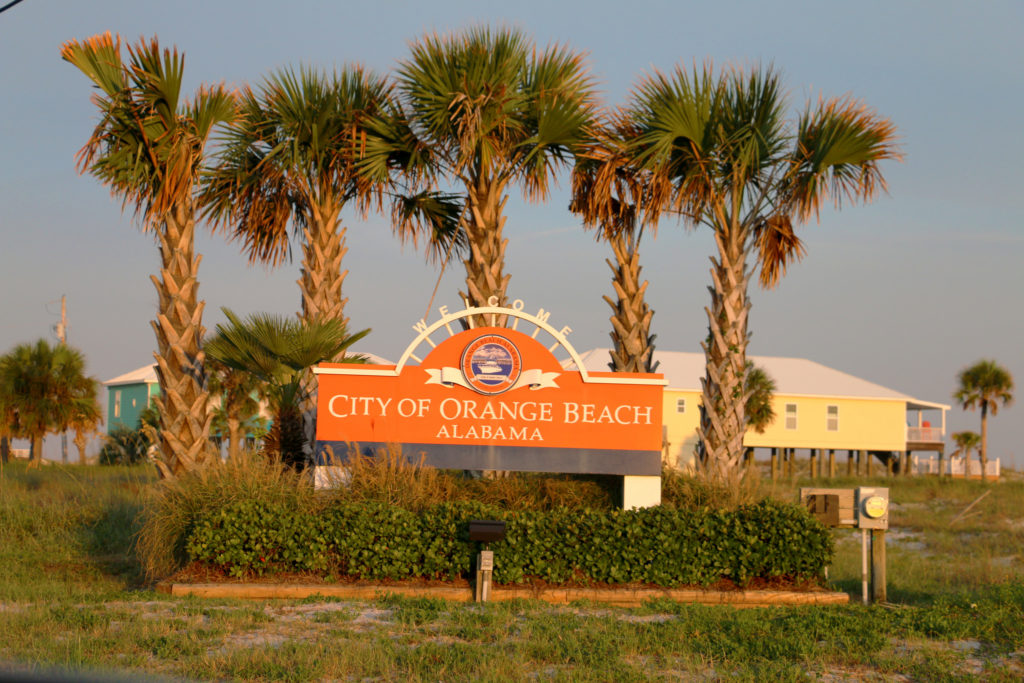Rauf Bolden: Vanishing property rights in Orange Beach

Power corrupts goes the old saying. Taking away residents’ property rights is the new infatuation, firstly with short-term rentals in residential areas, lastly with property condemnations, acquiring land for the proposed bridge west of the Foley Beach Express. “Eminent domain is a necessary evil,” said Mayor Tony Kennon, referring to three families who will lose their home-based businesses on property needed for the bridge, quoted in the Islander, April 25, 2018, pg. 29. The problem is not one single piece of data or traffic study was offered to the public, supporting the necessity of eminent domain condemnations for the $87 Million second bridge, causing Mr. Jim Ziegler, the State’s Auditor to write a letter to ALDOT’s Director John Cooper, seeking clarification. “I have more questions than I do answers about the proposed additional bridge. I hope to solve that with my specific requests for public records,” Alabama State Auditor Jim Zeigler explained on Twitter. Elected Officials acquiescing on the side of property condemnation is like airing a television campaign against property rights, watching our representatives watching a reality show. In a market system, well-defined property rights are important because they increase economic activity, bolstering standards of living, quality-of-life, and a strong tax base that is inextricably linked to property rights. Using a hammer instead of a scalpel to regulate short-term rentals, prescribing condemnation and eminent domain instead of negotiation to obtain property for the second bridge is scandalously inconsistent with Alabamians’ hatred of government intervention, rewriting the playbook on property rights. Local politicians prefer circling the wagons when residents disagree, appearing to have lost the ability to dissent. Perhaps we should exhale, taking a look at what has grown from the seedling of property rights since Orange Beach was founded in 1984 to the latest Ordinance 2018-1282, limiting vacation rentals. Mayor Tony Kennon said in a Council Meeting, “I want to know who my neighbors are,” commenting on short-term rentals, giving everyone in the room a glimpse into the plan. This rental legislation is like gating the residential community by Ordinance instead of by Referendum or HOA vote, wondering how elected officials will explain themselves for not minimizing government’s role in the economy, for not restoring liberty from government interference, essentially abandoning pre-eminent conservative ideals. By legislating for government restrictions on private property this Council transformed from conservative incumbent right before our eyes. It’s troubling not knowing what other instruments of economic disenfranchisement are on the agenda. What happens east and west of Docs Seafood when the Wolf Bay Bridge is put out for Bid, needing more land for a construction site, parking and a lay-down yard? One must assume properties will be condemned and then confiscated for pennies on the dollar, imitating the greater vanity of eminent domain. “We have to be able to move traffic. We’ve got to be able to evacuate and we have to be able to grow,” said Mayor Tony Kennon to AL.com. I agree that some short-term rental owners have been naughty, insufficiently policing their renters. Residents should call the authorities when renters misbehave, applying laws already on the books, perhaps implementing a three-strikes and you lose your license policy, ensuring Council has the last word. Tarring all residential-rental owners with the same brush is energetic but disillusioned. The Baldwin County Association of REALTORS® (BCAR), representing 2000 Realtors did not endorse candidates who voted for the Orange Beach residential rental ordinance, according to the BCAR web site. “REALTORS® care about communities and candidates who support private property rights,” said Sheila Dodson, CEO of BCAR. “This is just another platform to show the involvement of REALTORS® in their community.” A short-term rental ban, and eminent domain sit on the plate before us, cleverly salted to kneecap the opposition. How we chew and digest these morsels is up to us. ••• Rauf Bolden is retired IT Director at the City of Orange Beach, working as an IT & Web Consultant on the Beach Road. He can be reached at: publisher@velvetillusion.com.
Martha Roby: Combating the opioid crisis at home and across the country

There are countless important issues currently facing our state and nation. From our ongoing conversations with North Korea to the continuing need for enhanced security at the southern border, there’s no shortage of priorities that warrant discussion. Unfortunately, there is one very serious issue that continues to make headlines: the horrific opioid epidemic that is gripping our state and the entire country. I’m sure most of us know someone whose life has been affected by opioid abuse. Whether it’s prescription pain relievers or synthetic opioids like fentanyl, the crisis has only gotten worse. 64,070 people died from overdoses in our country in 2016, and 756 of those individuals were Alabamians. Now, in 2018, the problem has not improved. Did you know that 115 people in the United States die after overdosing on opioid drugs every single day? Just this year alone, it is estimated that more than 2 million Americans will suffer from opioid addiction. I’m pleased that last October, President Donald Trump declared the opioid crisis a public health emergency. This epidemic has been wreaking havoc on communities and families across our country for far too long. While the statistics are certainly shocking, this is about so much more than numbers. Hundreds of thousands of real American people with lives, careers, and families have lost the battle with opioid drug abuse. That’s why the House has made combating this crisis a top priority over the last several years. You may remember that back in 2016, Congress passed the Comprehensive Addiction and Recovery Act and the 21st Century Cures Act. Earlier this year, we provided $4 billion in government funding specifically to address the opioid crisis. Building upon this work, the House recently passed dozens of meaningful bills to further combat the opioid epidemic, and I’d like to share the four ways we are using this legislation to help fight this serious issue. First, with the recently passed legislation, the House is focusing on treatment and recovery. Our bills improve and expand access to treatment and recovery services, provide incentives for enhanced care, and establish comprehensive opioid recovery centers. Hundreds of thousands of Americans from all walks of life are currently trapped by addiction, and it is imperative that we provide the resources to treat their addiction and help them recover. Second, we’re aiming for prevention. Opioids are an important part of modern day medical care for pain treatment, but they are prescribed entirely too often – and at alarming rates. Our legislation addresses these high prescribing rates while enhancing prescription drug monitoring programs. We have the technology, and it’s past time we used it to more effectively address this crisis. Our legislation also encourages non-addictive opioid alternatives, when practical, to treat pain, and improves the data that allows us to identify and help at-risk patients before the problem becomes dangerously serious. Third, we’re making efforts to better protect communities of all sizes throughout the country by giving law enforcement the tools necessary to remove dangerous drugs. Our bills also enable us to better intercept illicit opioids at international mail facilities and improve access to federal resources for local communities. Last but certainly not least, we’re fighting fentanyl. The legislation we passed in the House allows us to better tackle these ever-changing synthetic drugs, crack down on foreign shipments of illicit drugs, and provide grants for communities to combat fentanyl that is destroying lives as we speak. I am proud of the efforts we’ve made in the House recently to press forward in our fight against this horrible crisis gripping our state and nation, but our work is far from complete. We owe it to the more than 40,000 Americans who die every year – and their families – to push on until strong progress is made. You can read more about our work to combat the opioid epidemic by visiting www.opioidcrisis.gop. ••• Martha Roby represents Alabama’s Second Congressional District. She lives in Montgomery, Alabama, with her husband Riley and their two children.
World Cup 2026 may yet have Birmingham presence

Timing is everything. And Birmingham’s timing for becoming a host city in the North American effort to secure the 2026 World Cup was awful. Wednesday, a combined bid from the United States, Mexico and Canada won the hosting rights. Sixty of the 80 matches, including the final, will be in the U.S. Last August, Birmingham was one of about 50 cities that received a bid package to become one of at least 11 U.S. venues, said Gene Hallman, president and CEO of the Bruno Event Team. “It was the worst timing,” said Hallman, who was a key player in bringing Olympic soccer to Birmingham in 1996. “Our challenge was, we had to bid Legion Field. Legion Field was not competitive.” Hallman said he called U.S. soccer officials about bidding the new stadium at the Birmingham-Jefferson Convention Complex (BJCC) as the city’s venue for games. At that time, though, funding for the stadium was not in place. “You can’t bid a hypothetical,” Hallman said. Still, Hallman said Birmingham may benefit from the winning North American bid. Atlanta “most certainly” will be one of the 11 U.S. venues, he said, and because Birmingham is close to Atlanta, the Magic City stands to gain. It helps, he said, that Birmingham has an “outstanding” relationship with U.S. Soccer. “We have a very strong possibility of being a host for a team, a country, to do all their training prior to the World Cup in Birmingham,” Hallman said. A rendering shows a stadium proposed for downtown Birmingham, near the Birmingham-Jefferson Convention Complex. (contributed) Also, Birmingham could become a medical hub for soccer players training and competing in the region to receive treatment, he said, as well as hosting large viewing parties of games that in previous cup competitions have been attended by thousands. Once the stadium at the BJCC is finished, Birmingham “will definitely be in the mix” for “friendlies,” Hallman said. “We’ll have a good five years of run-up where we can host a lot of competition prior to the World Cup,” he said. Hallman said it’s premature to talk about the potential economic impact the World Cup could have on Birmingham if the city ends up playing a prominent role. “But I can sit here and look into a crystal ball and tell you it’s going to be tens of millions of dollars, if not hundreds of millions of dollars. Because if you look at five years of potential activity at the new stadium, and given the fact that so many of the tickets that we sell to soccer events are to people who do not reside in this community, that’s a big economic impact,” he said. “That’s heads in beds and a very positive impact on the retail sector. So it will be a big economic impact and it will boost our image and reinforce our image as a very good host of international sporting competitions.” Republished with permission from the Alabama NewsCenter.
Facebook to invest $750 million in Alabama data center with 100 jobs

Facebook announced plans [Thursday] to build a $750 million data center in Huntsville that will create 100 high-paying jobs and provide a boost to Alabama’s emerging technology sector. Gov. Kay Ivey joined Facebook officials and local leaders [Thursday] afternoon at an announcement ceremony for the data center project at the Huntsville/Madison County Chamber. “We are excited to be joining the Huntsville community. As one of the fastest-growing tech hubs in the country, we knew it would be a great location for our newest data center,” said Matt VanderZanden, director of site selection at Facebook. “We are committed to having a positive impact at the local level and look forward to a strong partnership with the Huntsville community.” Facebook plans to invest $750 million to open a new data center in Huntsville with 100 workers. (Facebook) The Madison County facility will join Facebook’s global data center network, which keeps more than 2 billion users connected to the company’s family of services and apps, which include Facebook, Messenger, Instagram, WhatsApp and Oculus. Once construction is completed, the Huntsville data center will employ 100 people in jobs with an average annual salary of $80,000. ”Every day, millions of people around the world use Facebook’s products, and this new Alabama data center will soon play a role in keeping the company’s popular platforms running flawlessly,” Ivey said. “Facebook has found a great location in Sweet Home Alabama, and we’ll do our best to help the company grow and prosper here.” Facebook’s data centers keep 2 billion users connected to the company’s apps and services. (Facebook) ‘Project Starbelt’ Known previously only by the codename “Starbelt,” the data center will be in the North Huntsville Industrial Park. Last month, the Huntsville City Council gave unanimous approval for the company’s project entity, “Starbelt LLC” to purchase 340 acres in the park for $8.5 million. Facebook said it chose Huntsville because of quality-of-life factors, the city’s pro-business environment and the area’s educated and available workforce. “Huntsville’s Gig City strategy to sustain our position as a leader in the knowledge economy has brought us a company that knows something about creating connections,” Mayor Tommy Battle said. “Facebook has built its business on connecting friends to family, businesses to customers, and people to the world. “Huntsville is proud to be the center of these connections with the construction of this data center.” Adding Facebook to the roster of high-tech companies operating in Alabama will serve to raise the state’s profile in the technology sector, which has been gaining momentum with new projects recently. “Facebook’s decision to locate its new, state-of-the-art data center in Huntsville reflects Alabama’s attractiveness to technology companies, and marks another important chapter in the growth story of our tech sector,” said Greg Canfield, secretary of the Alabama Department of Commerce. “Facebook is a world-class company, and we look forward to building a lasting partnership that sets the stage for even more growth,” he added. This story originally appeared on the Alabama Department of Commerce’s Made in Alabama website. Republished with permission from the Alabama NewsCenter.
Here’s how the proposed FY19 CJS appropriations bill will affect Alabama

The Senate Appropriations Committee, on Thursday announced the full committee passage of the Fiscal Year 2019 Commerce, Justice, Science, and Related Agencies Appropriations Act. The bill contains $62.995 billion in funding for the U.S. Departments of Commerce and Justice, and independent agencies such as the National Aeronautics and Space Administration (NASA), the National Oceanic and Atmospheric Administration (NOAA), the National Science Foundation (NSF), and other agencies. Committee Chairman Alabama-Republican Sen. Richard Shelby said passage of the bill is a “vital step forward.” “This bill is the result of bipartisan efforts by the Committee to achieve a careful balance between competing priorities of law enforcement, national security, economic development, scientific research, and space exploration,” said Shelby. “Passage of the measure is a vital step forward in providing critical funding for core programs that impact Alabama, as well as the entire nation. I look forward to consideration of this bill before the full Senate.” The measure, which is $3.4 billion above the FY2018 enacted level, provides support for federal law enforcement agencies, state and local law enforcement grants, space exploration, basic science research, economic development programs, trade enforcement, and ocean observations and weather forecasting. The legislation includes the following provisions impacting Alabama: National Aeronautics and Space Administration (NASA) $21.3 billion for NASA, $587 million above the FY2018 enacted level and $1.43 billion above the budget request. $2.15 billion for the Space Launch System (SLS). $35 million for additive manufacturing. $75 million for a Nuclear Thermal Propulsion demonstration no later than 2024. Language encouraging NASA to work with government, academic, and industry partners to establish a Virtual Institute for Aerospace Systems Engineering, with the goal of improving mission success and affordability. National Science Foundation (NSF) $8.1 billion for NSF, $301 million above the FY2018 enacted level and $597 million above the request. Funding is provided for basic research across scientific disciplines to support the development of effective STEM programs. The bill provides $222 million above the FY2018 level for research and $13 million above FY2018 level for education activities. These funds will allow NSF to provide more grants to highly competitive research projects and help provide opportunities to prepare the next generation of STEM leaders. $177 million is provided for EPSCoR, an increase of $6 million above the FY2018 enacted level. $89.2 million is provided for the design and construction of three Regional Class Research Vessels (RCRV), with $60.5 million dedicated to the start of the third ship. By having three regional ships, the Gulf of Mexico and the East and West coasts will be able to have a dedicated RCRV to maximize research time in each of these regions. Federal Bureau of Investigation (FBI) FBI’s Terrorist Explosive Device Analytical Center (TEDAC): Provides no less than the FY2018 level for TEDAC operations and allows for funding of additional staff as new phases of operations continue to come online. FBI’s Hazardous Devices School (HDS): Maintains full operational funding for the Hazardous Devices School. Funding also fully supports the FBI’s Weapons of Mass Destruction Directorate (WMDD) explosives-related training operations. FBI Construction at Redstone: Provides critical funding for support of growing FBI presence at Redstone Arsenal. Law Enforcement Grant Programs $2.87 billion for state and local law enforcement and crime prevention grant programs, which includes grants for state and local law enforcement, the Office on Violence Against Women, and juvenile justice programs. Byrne Justice Assistance Grants (JAG): Provides $445 million for this comprehensive law enforcement grant program that assists police chiefs, district attorneys, and sheriffs. Anti-Opioid Initiative: Provides $360 million for programs that focus on prevention and education efforts, effective responses to those affected by substance abuse, and services for treatment and recovery from addiction. National Oceanic and Atmospheric Administration (NOAA) $5 million within NOAA for VORTEX-SE in collaboration with NSF to continue work on tornado formation studies in the southeast. $3 million for NOAA to implement the Seafood Import Monitoring Program. $40 million, a $4 million increase above the FY2018 enacted funding level, for the Northern Gulf Institute. National Water Center (NWC) Provides, at a minimum, $19.25 million for activities at the NWC, and mandates NOAA to accelerate staffing at the center to achieve full operating capability. Economic Development Administration (EDA) $305.5 million for EDA, including $117.5 million for its Public Works program, which supports brick-and-mortar projects in distressed communities across the nation. Funding for EDA also includes $25 million for the Regional Innovation Program, an increase of $4 million above the FY2018 level. International Trade Administration (ITA) $499 million for ITA, which includes a $4 million increase above the FY2018 level for ITA’s Enforcement and Compliance business unit to self-initiate investigations of foreign actors suspected of violating trade laws. The bill now moves to the full Senate for consideration.
Birmingham-based national women’s group takes on Microsoft, big tech

With Gov. Kay Ivey at the helm, Alabama has been hard at work luring new businesses to the state like ants to a picnic. It seems like every time you turn around, another big business it’s announcing its arrival or expansion in the Yellowhammer State. Just this week, Ivey on Thursday announced Facebook will invest $750 million to build a data center in Huntsville, creating 100 high-paying jobs. In April, Google broke ground on a new $600 million data center in Jackson County, Ala. It is expected to add upwards of 100 well-paying jobs with highly technical skill sets, including computer technicians, system administrators, software technicians and engineers. But one Birmingham-based national women’s is questioning at what price tech jobs, like these, are coming to the state. Women United — a group that describes itself as a next phase of the #MeToo movement, dedicated to defending all women by shining a light on men who take advantage of women, thinking they can hide or are above the law — is calling out the tech industry and companies like Microsoft for its long history of sexual harassment and discrimination challenges in the workplace in hopes of protecting Alabama women. “With the growth of tech companies has come a painful reality that women in the field face sexual harassment and discrimination challenges other industries have long since put behind them,” wrote the visionary behind Women United, Catrena Norris Carter in an AL.com op-ed. The 30-year veteran of both the civil rights and women’s movements in America isn’t accepting the news of new tech jobs without holding the industry accountable. The numbers don’t lie Sexual harassment runs rampant in the tech industry. Seventy-eight percent of women founders say they have been harassed or know someone who was, according to First Round Capital’s annual State of Startups survey. Discrimination is an issue as well. According to CNN tech, “89% of those making investment decisions at the top 72 firms are male, according to one survey. And in 2016, VCs put $64.9 billion into male-founded startups, compared to $1.5 billion into female-founded startups, according to new data from PitchBook.” And it’s not just taking place at startups. According to a filing, Women at Microsoft filed 238 complaints with the company’s HR department between 2010 and 2016, including 108 complaints about sexual harassment and 119 about gender discrimination. There were also eight complaints of retaliation and three about pregnancy discrimination, the filing said. The tech giant is currently in the midst of a court battle over these allegations. Looking for accountability Women United it looking to protect Alabama women from being added to the shocking statistics of sexual harassment and discrimination. “As our state–and, more specifically, our big cities, including Birmingham, Huntsville and Mobile–looks to attract and grow tech firms, we must demand accountability regarding discrimination and sexual harassment,” Carter continued. “When lawmakers are cutting deals, they must ask those companies what they are doing to foster a safer and healthier environment for women.” “We don’t need that culture in Alabama–no matter how many jobs and tax dollars it brings,” Carter concluded.
Donald Trump says FBI ‘plotting against my election’

President Donald Trump disputed findings by the Justice Department on Friday that former FBI Director James Comey‘s handling of the Hillary Clinton email probe was not politically motivated, declaring that the FBI was biased “at the top level” and “plotting against my election.” The department’s inspector general report, while critical of the FBI and Comey personally, did not find evidence that political bias tainted the investigation of Clinton’s email practices in the months and days leading up to Trump’s election. But on Friday, after tweeting that he did a “great service” to the nation by firing Comey, Trump marched out to the White House North Lawn to talk with “Fox & Friends” for more than half an hour, claiming the report “totally” exonerated him, then pointing to accomplishments he said he’s achieved and complaining about not getting proper credit. Then he turned to other reporters and went over the same list for another 20 minutes. On the inspector general report that found no political bias in the FBI’s final conclusions, he said, “The end result was wrong. There was total bias.” “Comey was the ring leader of this whole, you know, den of thieves. It was a den of thieves,” he said. Trump’s comments followed the IG’s 500-page report that said Comey was “insubordinate” in his handling of the Clinton investigation because he broke agency protocol. The report also rebuked FBI officials for exchanging anti-Trump text messages during the 2016 campaign. But it said, “We found no evidence that the conclusions by the prosecutors were affected by bias or other improper considerations; rather, we determined that they were based on the prosecutors’ assessment of the facts, the law and past department practice.” Trump’s supporters have argued that the findings are proof of political bias at the FBI’s highest levels that then tainted the Russia investigation, first led by the FBI and now by special counsel Robert Mueller. Mueller’s probe includes a look into whether Trump himself tried to obstruct justice by firing Comey. Trump said Friday, as he has before, that the Mueller probe, too, “has been totally discredited.” “The IG Report is a total disaster for Comey, his minions and sadly, the FBI,” Trump tweeted earlier. “Comey will now officially go down as the worst leader, by far, in the history of the FBI. I did a great service to the people in firing him. Good Instincts.” Trump’s personal lawyer, Rudy Giuliani, told “Fox & Friends” that the report casts doubt on whether Trump will ever agree to an interview with Mueller’s team because “why would he get interviewed by a corrupt investigation?” Trump himself said he had “reservations.” Thursday’s report documents in painstaking detail one of the most consequential investigations in modern FBI history and reveals how the bureau, which for decades has endeavored to stand apart from politics, came to be entangled in the 2016 presidential election. It underscores efforts by FBI and Justice Department leaders to juggle developments in the Clinton investigation — she had used private email for government business while secretary of state — with a separate probe that was then unknown to the American public into potential coordination between the Trump campaign and Russia. Clinton supporters believe Comey’s actions, far from hurting Trump, may well have torpedoed her chance of becoming president. The IG found the FBI director erred when he announced in July 2016 that Clinton had been “extremely careless” with classified material but would not be charged with any crime, and again months later when Comey told Congress just days before the election that the investigation into Clinton’s emails had been reopened. Comey concealed from the Justice Department his plans to make a public announcement until the morning he did so, even though such statements are normally handled by the Justice Department, if at all, the report says. “We found that it was extraordinary and insubordinate for Comey to do so, and we found none of his reasons to be a persuasive basis for deviating from well-established Department policies in a way intentionally designed to avoid supervision by department leadership over his actions,” the report says. Trump supporters, and then the president himself, quickly focused on the report’s recounting of anti-Trump text messages from two FBI officials who worked the Clinton probe and later the Russia case, including one in which an agent says, “We’ll stop it,” with regard to a possible Trump victory. The report suggests that text from Peter Strzok, who was later dropped from Mueller’s team, “implies a willingness to take official action to impact the presidential candidate’s electoral prospects.” It did not find evidence that those views seeped into the investigation. FBI Director Chris Wray told reporters the FBI accepted the report’s findings and was making changes, including requiring further training for FBI employees and re-emphasizing the importance of objectivity. In a New York Times opinion piece released after the report, Comey said he disagreed with some conclusions but respected the watchdog’s work. Also criticized in the report was Comey’s decision, despite the discouragement of the Justice Department, to reveal to Congress that the FBI was reopening the investigation following the discovery of new emails. The FBI obtained a warrant nine days before the presidential election to review those emails, found on the laptop of former U.S. Rep. Anthony Weiner, D-N.Y., — the husband of top Hillary Clinton aide Huma Abedin — and ultimately determined there was nothing that changed its original conclusion. The report faulted the FBI for failing to act with more urgency in reviewing emails from Weiner’s laptop, saying the inaction had “potentially far-reaching consequences.” Clinton supporters say her name could have been cleared well before the election had the FBI moved faster to review the emails. Comey said had he known earlier about the laptop’s import, it might have affected his decision to notify Congress. The report also notes that Comey, despite chiding Clinton for mishandling government business, occasionally used personal email himself to discuss FBI matters. “But my emails,” she said,
AP Explains: Poor People’s Campaign 1968 vs. 2018

Thousands of anti-poverty activists have launched a campaign in recent weeks modeled after Rev. Martin Luther King Jr.‘s Poor People’s Campaign of 1968. Like the push 50 years ago, advocates are hoping to draw attention to those struggling with deep poverty from Appalachia to the Mississippi Delta, from the American Southwest to California’s farm country. The latest effort is led by Rev. William Barber of Goldsboro, North Carolina, and Rev. Liz Theoharis of New York City, who are encouraging activists in 40 states to take part in acts of civil disobedience, teach-ins and demonstrations to force communities to address poverty. They say poverty continues to be ignored and only a “moral revival” can bring it to the nation’s consciousness. The new campaign has also brought new attention to the tumultuous summer of 1968 when the two leading backers of the campaign — King and Robert F. Kennedy — were assassinated two months apart. Here’s a look at the two campaigns: THE ORIGINAL CAMPAIGN Before his assassination, King sought to organize a campaign to direct the country’s attention toward poverty. He felt attacking poverty was the next phase of the civil rights movement and the 1968 campaign would push for a guaranteed income, the end to housing discrimination and reducing the nation’s growing trend toward militarism. At the time, around 13 percent of U.S. residents lived in poverty. King reached out to Mexican-American, Native American and Appalachia white leaders to build a multi-ethnic, multiracial coalition that would come from their hometowns on “mule carts” and “old trucks” to Washington, D.C., to dramatize the plight of the poor. Following King’s assassination in Memphis, members of the coalition began to fight with each other. Thousands of poor people set up a shantytown they called “Resurrection City” on the Washington National Mall but became demoralized by racial tensions, a lack of leadership, and eventually, the assassination of Kennedy. THE REBOOT Organizers of the 2018 campaign said they wanted to use the 50th anniversary of the 1968 effort to restart conversations around the struggles that poor people continue to face, especially since the U.S. poverty rate is roughly back to around 13 percent. This time, Barber and Theoharis said the campaign won’t be centered solely in Washington and would include events around the country. For 40 days, demonstrators planned to hold acts of civil disobedience like blocking traffic and refusing to leave public buildings every Monday nationwide. Hundreds of activists, including Rev. Jesse Jackson, have been arrested so far. Theoharis said the purpose is to build “a season of organizing” to create a long-term movement aimed at restoring the Voting Rights Act, ending gerrymandering, and helping bolster the minimum wage. She said organizers also hope to influence the 2018 midterm elections and the 2020 presidential election. Because the nation is more diverse than in 1968, Barber said the new campaign also calls for protection of immigrant, LGBT residents and refugees from the Middle East. THE CHALLENGES Barber said media coverage of poverty has been ignored and overshadowed by what he calls “Trump porn” — excessive coverage of President Donald Trump‘s tweets, the investigation into Russia’s interference in the 2016 U.S. election and the legal fight involving adult film actress Stormy Daniels. Small newspapers that used to cover poor rural areas like Linden, Tennessee and the Pine Ridge Indian Reservation in South Dakota also have faced cutbacks. Not since Kennedy’s 1968 presidential campaign have national politicians regularly visited rural, poor areas and focused on poverty in their platforms. In addition, Barber said many American Christians have ignored the plight of the poor since megachurches regularly focus on the “prosperity Gospel.” Others have been focused solely on abortion and fighting gay rights, he said. Barber said the multi-faith campaign seeks to reaffirm messages that religious figures like Jesus were primarily concerned about helping the poor and that the country had a moral obligation to tackle poverty. He also promised that organizers plan to pressure for media coverage of U.S.-Mexico border areas like El Paso, Texas, and Native American communities like San Carlos Apache Indian Reservation in Arizona. Republished with permission from the Associated Press.


